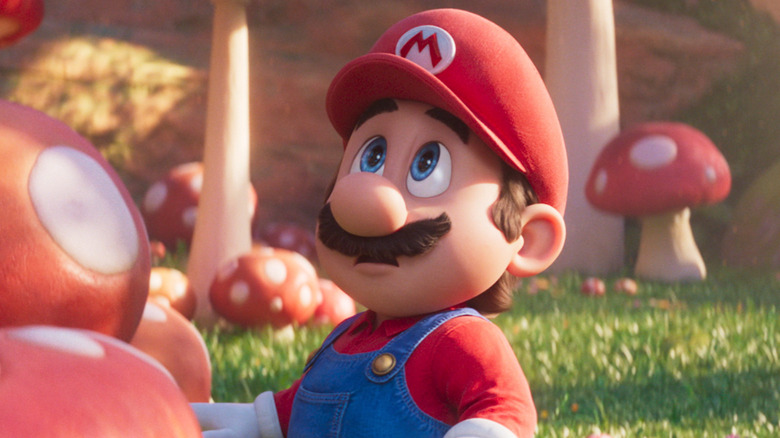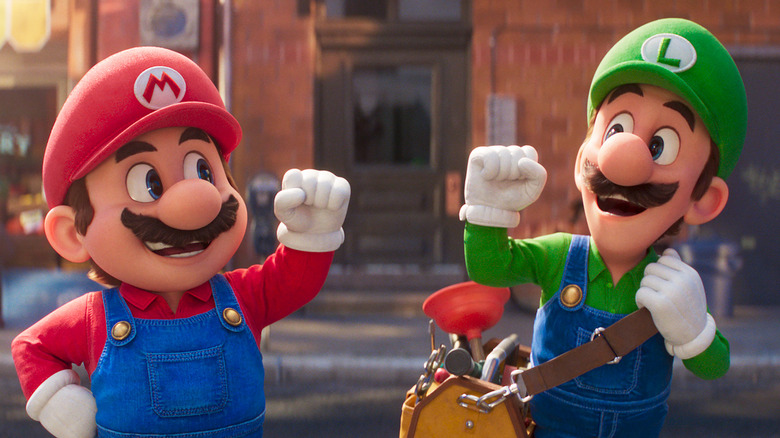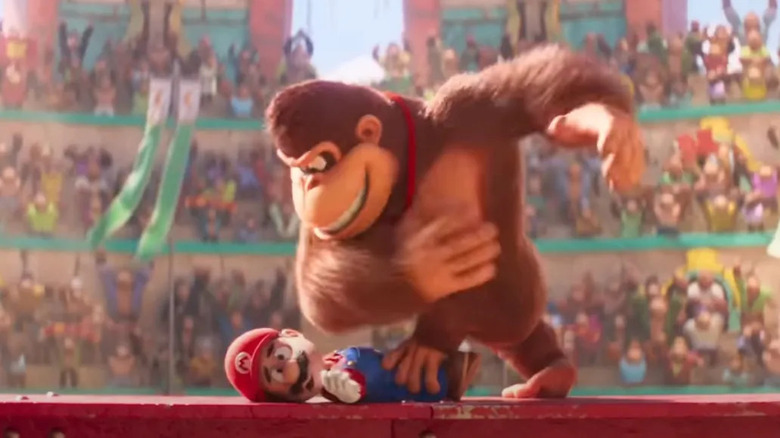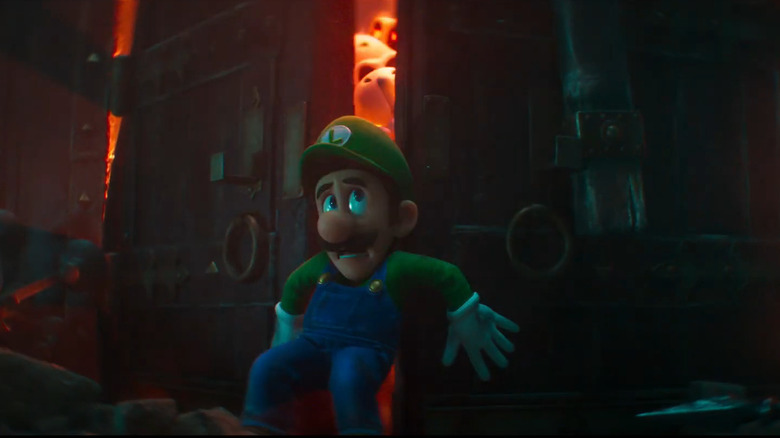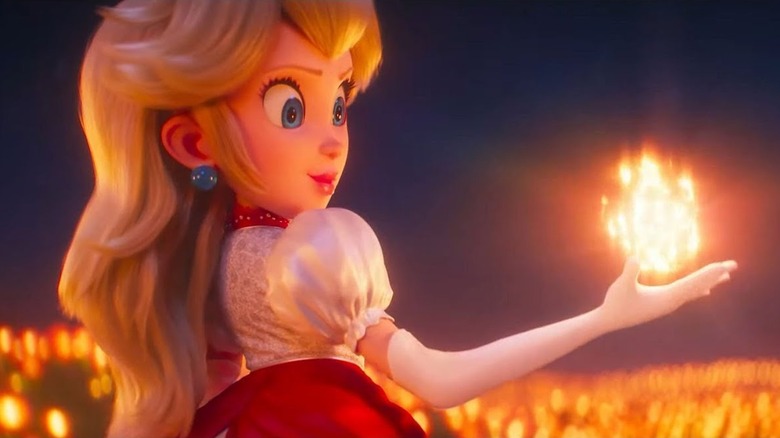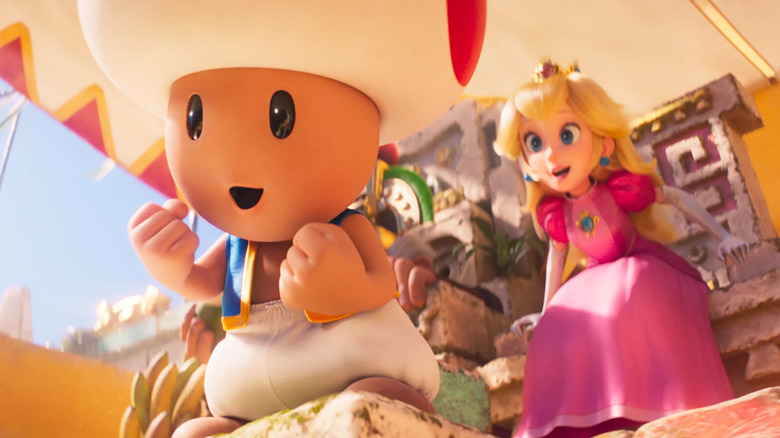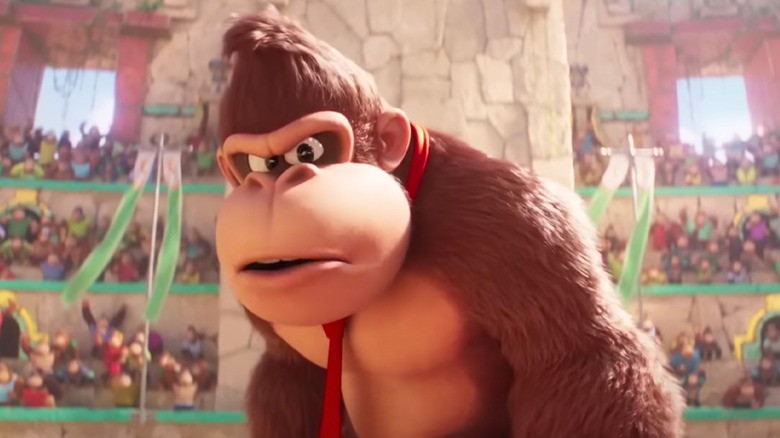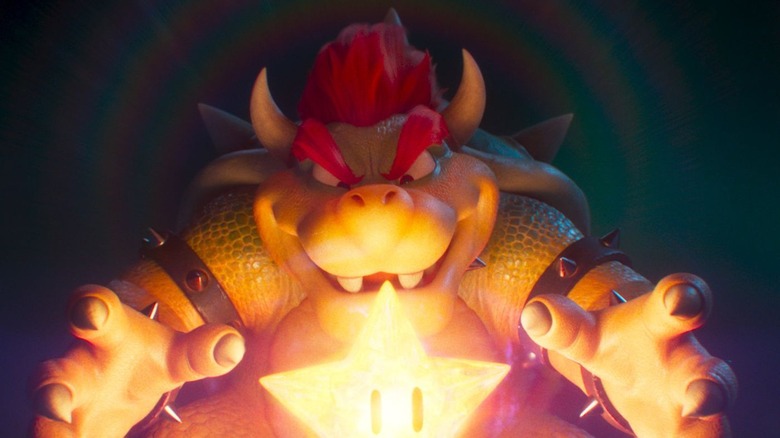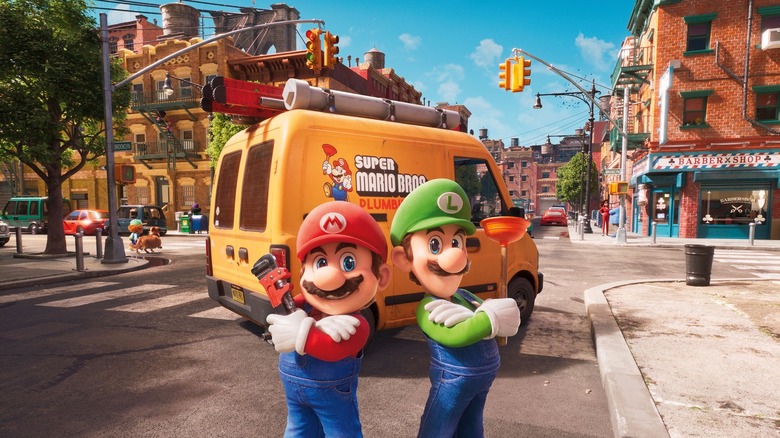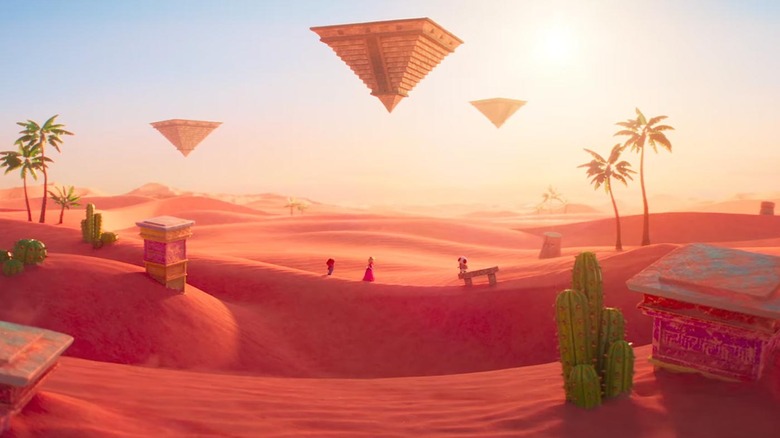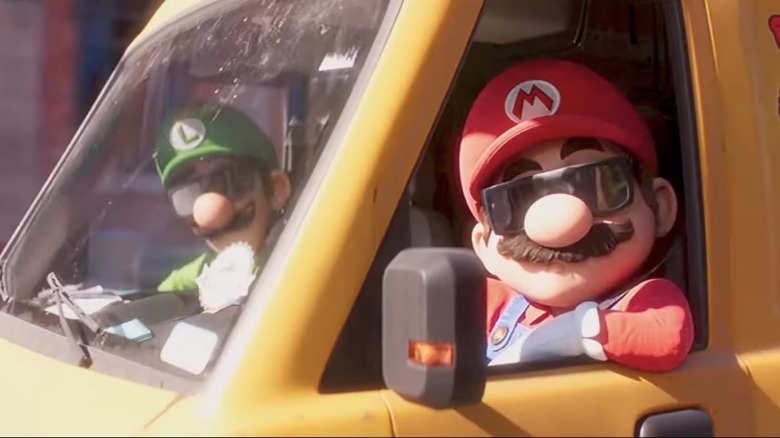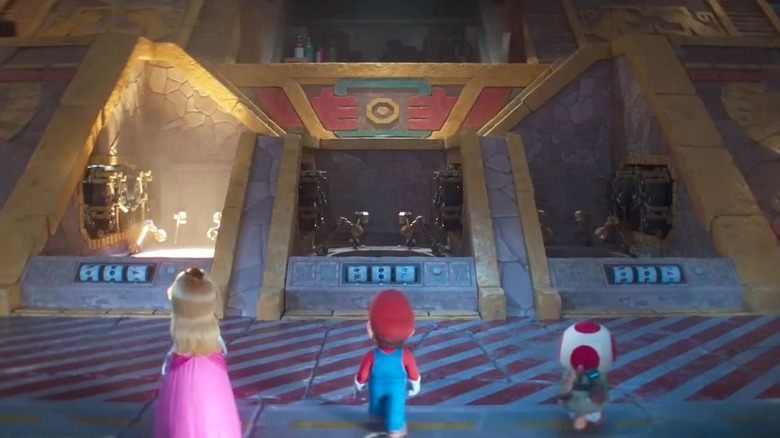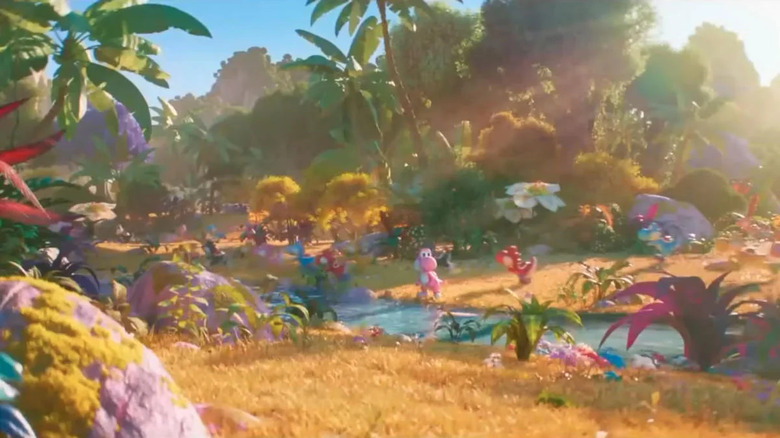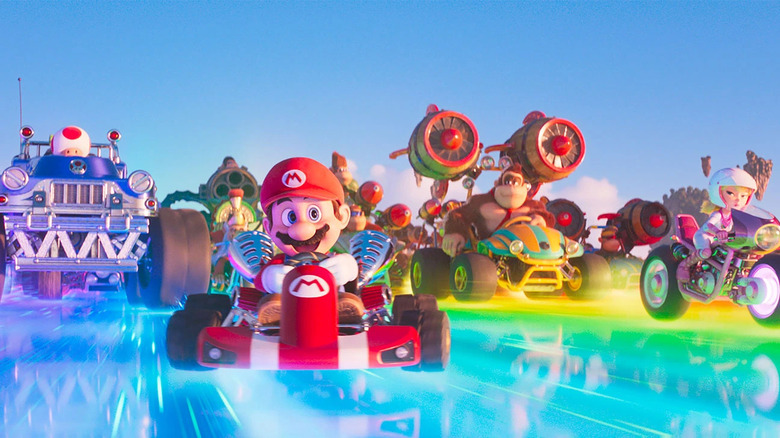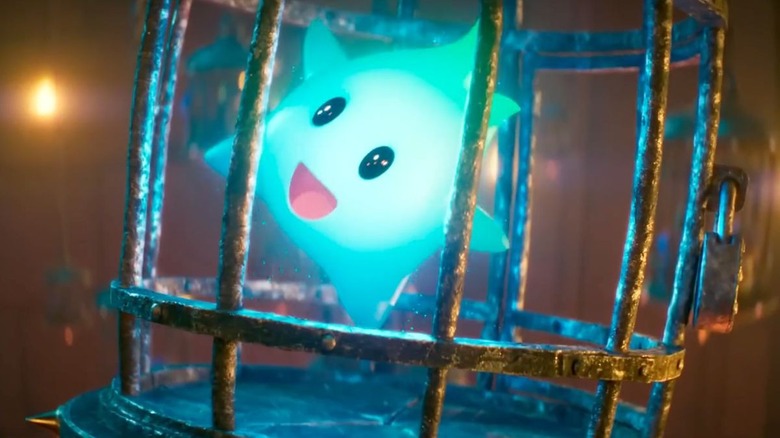The Ending Of The Super Mario Bros. Movie Explained
Following many years of anticipation, "The Super Mario Bros. Movie" hit theaters to solid box-office, thanks to legions of eager fans.
The project began development as early as 2014, with official plans for Illumination, the company behind "Despicable Me" and "The Secret Life of Pets," to produce. After the infamously disappointing 1993 film adaptation starring Bob Hoskins and John Leguizamo, Nintendo had been gun-shy about once again licensing their crown jewel property for a feature film, but Illumination's track record made them come around.
The final product has had a tumultuous production since the beginning, with Chris Pratt's voice casting as Mario (over original voice actor Charles Martinet) upsetting some. But early trailers and sneak peeks looked good enough to persuade audiences to hang in there.
"The Super Mario Bros. Movie" follows Mario getting separated from Luigi as they are transported to the unfamiliar Mushroom Kingdom, where Mario teams up with Princess Peach and Toad to rescue his brother from the clutches of Bowser. Critical reception has been mixed, with some speaking highly of the movie's visuals and adherence to Mario's video game origins (IGN calls it "constantly and joyfully entertaining") and others having issues with the film's narrative and character development ("Mamma mia. The narrative is very thin," writes the Boston Globe. "Mario and Luigi have not much personality beyond the cliches"). The day of release, the film sat at 54% on the Tomatometer.
If you left the film without realizing there was an end credits scene, or simply want an Easter-egg-friendly breakdown of all that eye-popping third act action, read on. Below is a (spoiler-heavy) breakdown of the ending of the flick.
Mario and Luigi work best when they're together
Many critics noted that the film's central theme ties into its title: Mario and Luigi make a heckuva team. The two brothers receive more development in "The Super Mario Bros. Movie" than they've had in any previous incarnation, even going so far as introducing their loud, large Italian family. Video game publications like The Gamer praised Pratt and Charlie Day, who voice the pair with vocal chemistry that feels like fireworks, claiming "[their] camaraderie ... makes the movie land."
That being said, Mario and Luigi spend the bulk of "The Super Mario Bros. Movie" apart. Luigi is captured by Bowser's evil forces early on, placing him as something of a damsel-in-distress, rather than Princess Peach. Their conflict-free, supportive relationship in the film's opening drives Mario's desire to rescue Luigi throughout the film, but he still finds himself struggling to do anything right on his own, relying on power-ups to defeat Donkey Kong and overcome Bowser's army.
During the film's climactic showdown with Bowser, a beaten-up Mario finds himself in the pizzeria from the film's opening, watching the plumbing company commercial he and Luigi spent all their money to make. He's reminded of how his brother makes him feel like a superhero, which goes back all the way to his protection of Luigi as kids. It makes for a thrilling end to the film, as the two brothers work together to take on Bowser.
Mario may be short, but he's no pushover
Although Mario's relationship with Luigi makes him courageous, he's certainly prone to being picked on throughout "The Super Mario Bros. Movie." In one of the film's first scenes, Mario and Luigi's pizzeria celebration is cut short by Foreman Spike, their former boss (voiced by Sebastian Maniscalco), who mocks their plumbing company and physically intimidates an overconfident Mario when he tries to defend his brother. As Luigi remarks during this scene, Mario is crazy to stand up to someone three times his size.
His introduction to Princess Peach emphasizes this, as she remarks at how small Mario is (until she gives him a Red Mushroom and he grows in size). Mario's lack of strength is a sore spot for the Brooklyn plumber, although he's given a chance to prove himself when King Cranky Kong demands he fight his son, Donkey Kong, in exchange for the support of the Kong army. Donkey Kong somewhat represents everything Mario is missing: He's a widely-beloved, powerful, cocky showman.
Even though Mario and Donkey Kong make for natural enemies, their reluctant friendship was appealing to DK voice actor Seth Rogen, who told The Hollywood Reporter that "the dynamic of this guy who hates Mario and is kind of stuck with him ... was funny." Ultimately, it is Mario's heroism and found confidence that not only wins over Donkey Kong in the end, but even Foreman Spike, who leads a crowd in Brooklyn cheering on the Mario Brothers to victory.
Luigi conquers his fear... for now?
Charlie Day's casting as Luigi was favored among Nintendo fans, mainly due to Day's longtime work on "It's Always Sunny in Philadelphia." "The Super Mario Bros. Movie" finds him treading similar territory as Mario's less-confident brother Luigi. In particular, the early scenes in the movie depict Luigi's anxiety and fear, such as a plumbing job gone wrong that finds Luigi the object of a dog's ire when he steps on its chew bone.
However, this fear pales in comparison to Luigi's terror when he ends up sucked into another world, separated from Mario and ending up in the Dark Lands, Bowser's home turf. In a scene that will delight fans of "Luigi's Mansion," Luigi abandons his flashlight to outrun a horde of Dry Bones, ending up in a castle where he's ambushed by Shy Guys. In a later flashback, Luigi reminisces on his childhood years, when Mario rescued a meek baby Luigi from playground bullies.
By the time Luigi reunites with Mario during the film's third act, Luigi gains more fearlessness in an effort to save his brother for once. As Mario is about to be engulfed by Bowser's flame, Luigi defends him with a sewer plate, before the two take the Super Star for themselves and use it to kick Bowser's butt. Nevertheless, Luigi may regain his fear in the future, especially if Day lives up to his hope of wanting to do a "Luigi's Mansion" movie.
Princess Peach's backstory remains up in the air
Little is known about Peach from the "Super Mario Bros." game series, despite being playable in titles like "Super Princess Peach" and "Super Mario 3D World." For fans of Mario's frequent damsel-in-distress, the character gets a great opportunity to be fleshed out with her role in "The Super Mario Bros. Movie," the way franchise creator Shigeru Miyamoto always intended (via Kotaku). In a contrast to her more helpless video game appearances, Anya Taylor-Joy's Princess Peach is a full-blown fighter, but she wasn't always that way.
During a scene in a Fire Flower field, Peach opens up to Mario about her past, revealing as a baby she stumbled out of a green pipe into the Mushroom Kingdom, where she was taken in by the Toads, who raised and crowned her as their princess when she became of age. In the film, this justifies Peach's determination to protect her people, especially when Bowser threatens to harm them if Peach refuses to marry him. However, an important question is raised by Mario: Is Peach from his world?
Unfortunately, the question isn't answered in this film, but it opens a lot of opportunities to explore Peach's backstory in a spin-off or sequel. Perhaps Peach's origins lie in Sarasaland, the homeland of Peach's counterpart, Princess Daisy. Peach being from New York could also be an interesting plot twist to connect the Mushroom Kingdom with Mario's homeland, perhaps even sharing relation to Brooklyn's Mayor Pauline.
Toad proves himself to the princess
Keegan-Michael Key's Toad is a heartwarming presence in "The Super Mario Bros. Movie," Mario's first encounter when he ends up in the Mushroom Kingdom. For parts of the film's early scenes, Toad acts as a guide to Mario on his way to Princess Peach, though Toad is shockingly turned down by her castle guards. Though he appears to be driven, resourceful, and loyal to his princess, the courtesy is not extended back, as it appears.
That is, until Toad joins Mario and Peach's journey to the Jungle Kingdom, offering her protection, which Peach accepts. Toad mainly rides in the backseat for the adventure, playing the role of comic relief, especially when he creates a monster truck-like kart during their time in the Jungle Kingdom. However, the Rainbow Road sequence doesn't go the Mushroom Kingdom's way, as Bowser's army ambushes and captures the Kong army.
Toad is quite the unlucky kart racer, as his truck goes over the edge of Rainbow Road, but he's saved by Peach and her motorbike's hang-glider. The two return to the Mushroom Kingdom to evacuate the citizens, but despite Peach's encouragement for him to join the others, Toad makes the choice to stay and protect Peach as best he can, or as Key told IGN, "he's been waiting for an adventure like this his entire life." This time, Peach isn't so eager to turn Toad away, and even agrees to marry Bowser to spare him from torture.
Donkey Kong earns his father's approval
Donkey Kong's entrance in "The Super Mario Bros. Movie" is one of the more energetic moments in the film, as a coliseum full of Kongs cheer on King Cranky Kong's beloved son. However, there's a clear history between Donkey Kong's showmanship in front of a crowd and Cranky Kong's own acceptance of him; as DK begins to flex his pecs, Cranky Kong is visibly embarrassed. Furthermore, Donkey Kong takes moments during his fight with Mario to ask his father if he's looking for him.
For voice actor Seth Rogen, the desire to expand upon DK's character was a draw to the film, telling The Wrap, "Fundamentally people don't know much about Donkey Kong other than he throws barrels and he hates Mario." However, when Mario defeats Donkey Kong in combat, to the surprise of Cranky Kong, there's more revealed about the character's inner psychology, particularly how nasty he can be to Mario as a result of being shown up in front of his father.
By the time Donkey Kong and Mario end up swallowed by a Maw-Ray after the disaster on Rainbow Road, audiences can draw a clear parallel between Donkey Kong and Mario's desperation to make their fathers proud. Fortunately, they both achieve that, as Donkey Kong rescues Cranky Kong at the end of the film and is given approval to show off his pecs as a reward. That being said, Cranky Kong does seem like the type to revoke that approval.
Bowser has been shrunken to a tinier problem
Jack Black's performance as Bowser might be the best part of "The Super Mario Bros. Movie"; Variety calls his work "stupendous" and says that "when Bowser in onscreen ... the audience is in heaven." The monster first appears as a menacing tyrant hellbent on destroying the Mushroom Kingdom, but halfway through the movie it's revealed that Bowser's ultimate purpose isn't conquest, but love. Even his own army is off-put by the idea that Bowser's main ambition is to marry Princess Peach, whom he pines for despite her hatred of him.
While this leads to some humorous sequences as Bowser performs a serenade to Peach and even practices a mock proposal with Kamek dressed as Peach (a reference to titles like "Mario & Luigi: Dream Team"), it also drives Bowser's furious hatred of Mario and his brother. When Peach ends up ambushing Bowser and his army at the altar, Bowser angrily summons a Banzai Bill and subdues Mario in his hometown of Brooklyn, nearly defeating the overconfident plumber.
Nevertheless, Bowser is no match for Mario and Luigi's teamwork, getting knocked off his feet as Peach forces him to eat a Blue Mushroom, shrinking him down to size. Toad traps the once-threatening baddie in a bottle, and a mid-credits scene finds Bowser kept in a cage in the Mushroom Kingdom, with only his piano to keep him company. However, this means Bowser will be in close proximity for any future sequels.
The Mushroom Kingdom has made its way to Brooklyn
Brooklyn originated as the birthplace of Mario and Luigi in an unlikely title: the MS-DOS educational game "Mario's Time Machine," which was reinforced by official comic books, Nintendo Power magazine, and "The Super Mario Bros. Super Show!" The New York borough has never made an official appearance in the video games, but it plays a big role in the opening of "The Super Mario Bros. Movie," depicting Mario and Luigi's struggling plumbing business and family life.
In typical storytelling fashion, the final scenes of "The Super Mario Bros. Movie" take the plumber brothers' conflict with Bowser back through the green pipe and into their home of Brooklyn. It's a moment where Mario and Luigi get a chance to prove themselves not just to Peach, Donkey Kong, and the rest, but to those who doubted them at home, like their parents and Foreman Spike, whose car gets totaled by a giant mushroom.
A sequel to "The Super Mario Bros. Movie" could delve into the implications of this crossing of worlds. In the earlier scenes of the movie, Brooklyn was in mayhem after an underground sewage leak, which flooded the city's streets and encouraged Mario and Luigi to investigate the green pipes in the first place. If anything, it'd be great to get a better look at the city, which is riddled with Easter eggs alluding to Nintendo's history, as well as various entries in the "Mario" franchise.
What other kingdoms are out there?
Most of the action in "The Super Mario Bros. Movie" takes place either in Mario and Luigi's home of Brooklyn, or the alternate worlds of the Mushroom Kingdom, Jungle Kingdom, and Dark Lands. However, there are plenty additional areas familiar to "Super Mario Bros." fans that appear throughout the film, albeit briefly. On various world maps, players can spot a desert-looking kingdom, as well as one that resembles the aesthetics of the "Yoshi's Island" video game series.
Both of these kingdoms make appearances during a mid-movie montage where Mario, Peach, and Toad traverse the lands on their way to the Jungle Kingdom. The desert-looking kingdom from the map, up-close, strongly resembles the Sand Kingdom from "Super Mario Odyssey," the most recent mainline entry in the franchise. Though its colorful pillars and floating pyramids will be familiar to fans, Mario and his friends don't spend any time in Tostarena Town, which might be saved for a future film.
A brief moment also gives a glimpse at Yoshi's Island, featuring a flock of Yoshi running through a field. Perhaps a sequel to "The Super Mario Bros. Movie" could flesh out some of these barely-seen kingdoms, from the Penguin Kingdom in the movie's opening to wherever the character of Lumalee is from, which may bring back locations from titles like "Super Mario Galaxy." Of course, there's plenty more kingdoms to explore from "Super Mario Odyssey" as well.
A Mario family reunion could get a little messy
One of the biggest shocks for many longtime "Super Mario Bros." fans was getting to see Mario and Luigi's family. The scenes make sense for the local plumber brothers, with Miyamoto describing Mario in an interview with The Los Angeles Times as "so relatable. He's an Everyman character." It's this quality that drives Mario's scenes with his family, particularly a tense dinner where he's mocked over their new commercial, and Mario's father (voiced by the plumber's OG voice actor Charles Martinet) disagreeing with his choice to venture out on his own.
Although the Mario family end up hugging and making up at the end, the theme of heroes wanting to impress their fathers is a strong one in "The Super Mario Bros. Movie," though perhaps future films will introduce even more family conflicts. Two characters that could become involved are Mario and Luigi's evil counterparts, Wario and Waluigi.
It's never been clarified in the lore of "Super Mario Bros." if Mario and Luigi are even related to Wario and Waluigi, or if the latter two are even related to each other at all. Nevertheless, given their resemblance to their heroic counterparts, audiences could easily be on board with a sequel somehow pitting those two against them as distant cousins of the Mario brothers, who arrive to stir up trouble.
The Kong Kingdom seems primed for a spin-off
Audiences spend quite a bit of time in the Jungle Kingdom, as Peach, Mario, and Toad venture there to recruit the Kong army to defend the Toads against Bowser's incoming forces. This sequence shows off an extensive look at the Jungle Kingdom that varies a lot from what fans may be accustomed to from the "Donkey Kong Country" games. In "The Super Mario Bros. Movie," the Jungle Kingdom has a highly-advanced road system, complete with high-octane kart drivers.
Furthermore, plenty of iconic "Donkey Kong Country" characters make cameos in the movie. Aside from Donkey Kong and Cranky Kong, there are pretty big appearances from Diddy Kong, Dixie Kong, and Funky Kong. Thankfully for fans of the "Donkey Kong" games, rumors of Illumination giving Rogen's character his own spin-off have been circling since 2021. He even reiterated his support for a "Donkey Kong Country" movie in an interview with ScreenRant.
It seems as if a "Donkey Kong Country" spin-off is possible within the next few years, since the cast of Kongs has already been assembled. The only thing left is for the Jungle Kingdom to be thrown into disarray by the arrival of a villain like King K. Rool, who recently got a revival in the Nintendo world by appearing as a playable character in "Super Smash Bros. Ultimate," which marked his first video game appearance since "Mario Super Sluggers" over a decade earlier.
A post-credits scene teases the debut of a familiar Mario ally
Hopefully, audiences don't leave too early before the end of the credits to "The Super Mario Bros. Movie." It's always nice to see all the great artists who worked on the film, even though some, like "Donkey Kong 64" composer Grant Kirkhope, weren't credited (via Kotaku). As a bonus, fans get to see a post-credits scene, which alludes to the direction of a possible sequel set in the "Super Mario Bros." universe.
In the post-credits scene, the underground sewage system of Brooklyn from the film's opening is explored, revealing an artifact left behind from the Mushroom Kingdom's crossover: A lone white egg with green spots, which "Super Mario Bros." fans will clearly recognize as belonging to Yoshi, one of Mario's most famous allies.
Yoshi first appeared in the SNES title "Super Mario World," though the character's design dates back to the release of the original "Super Mario Bros." in 1985, according to IGN. The character later spawned his own spin-off franchise with "Yoshi's Island." Before the film finally cuts to black, the egg begins to crack, and Yoshi's iconic yelp can be heard.
As Chris Pratt indicated in an interview with CBR, the film's post-credits scene "gets [him] very, very excited" about the prospect of doing another movie as Mario. Next time around, perhaps Mario will get to ride Yoshi in a sequence just as thrilling as the "Mario Kart" moment from "The Super Mario Bros. Movie."
The future looks bright for video game movies
Video game adaptations have earned a poor reputation over the past several decades. Of course, the original "Super Mario Bros." film from 1993 didn't help that cause, but adaptations like "Prince of Persia," "Doom," "Monster Hunter" and pretty much anything made by Uwe Boll only reiterated how disastrous it can be when filmmakers lack respect for the source material, a trend that made IGN note in 2023 that "critics seem to grade adaptations by harsher standards."
Things seemed primed to change with the "Sonic the Hedgehog" films, but the past year has seen the start of what may be a renaissance of video game adaptations. HBO's adaptation of Naughty Dog's "The Last of Us," starring Pedro Pascal and Bella Ramsey, was acclaimed by critics for its loyalty to the original game as well as its diversions. "The Super Mario Bros. Movie" walks a similar path, as the film has been praised for its fan-service and appeal to children, despite some critics panning its plot.
Overall, it seems that the message is becoming clear that video game fans appreciate adaptations that respect the original material, while also elevating it. With recent rumors surrounding Phoebe Waller-Bridge developing a "Tomb Raider" series for Amazon Prime, as well Oscar Isaac's long-awaited "Metal Gear Solid" movie, perhaps there will be many more successful video game adaptations in the coming years.
The Nintendo Cinematic Universe may be just beginning
What's even a greater possibility than more great video game adaptations is an expansion of Nintendo's cinematic universe. With some finding weak spots lately in the armor of the Marvel Cinematic Universe, Nintendo could have the perfect opening to swoop in. With talk of "Donkey Kong Country" and "Luigi's Mansion" on the table, the time is now for Nintendo's other properties to have their moment to shine.
In particular, "The Legend of Zelda" could make for a popular adaptation after having been rumored for years, with Nintendo allegedly shelving a Netflix series based on the iconic fantasy franchise. Fan support has also increased in recent years for adaptations of video game series like "Star Fox," "Animal Crossing," and "Metroid," the latter of which has even accrued support from actors like Brie Larson, who campaigned to play Samus Aran in a film adaptation.
It's unclear whether Nintendo actually has solid plans to form their own Nintendo cinematic universe, complete with an "Avengers"-like "Super Smash Bros." movie at its climax. But given how much "The Super Mario Bros. Movie" pays tribute to Nintendo's gaming history, from "Punch-Out!!" to "Kid Icarus," it could lead to the company putting even more trust on Illumination. Perhaps, "The Super Mario Bros. Movie" is just the beginning.
